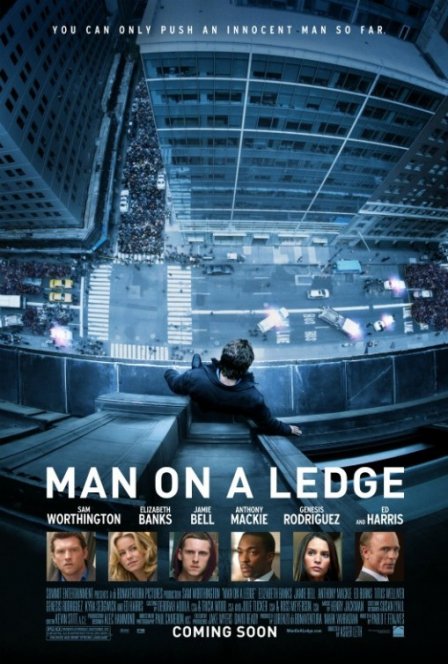Agreeably breezy is the phrase that first comes to mind when I think about saying something about Man on a Ledge, and while that seems like a funny way to describe a movie about a man at the end of his human tether and ready to splatter himself across a Manhattan street, it’s nevertheless accurate. There’s nothing actually at risk in this movie — not for one second is its tension heightened beyond what is basically expected by its setup, not for one second is there the sense that some ambiguity might exist in the good vs. evil world this movie dreams up. Modern undertones of Wall Street corruption and economic frustration be damned, everything will work out stunningly in this movie’s conception of the hard life.
While it’s implausible, simplistic, and doesn’t really attempt to find the heart of characters whose fates we are supposed to be invested in, there are two nice things that can be said for Man on a Ledge: (1) it’s short — swift would be a cooler way of putting it — and (2) it announces its lack of ambition loudly, in every new scene. You could even say that Man on a Ledge regards its audience highly, that it genuinely wants to make people feel smarter for being able to guess the outcome of a movie. There are no surprises here, just one falsely accused cop (Sam Worthington) threatening a bunch of other cops (Elizabeth Banks, Edward Burns) with a suicide jump in order (no spoilers here either; all of this is discernible from the trailer) to distract everyone from the heist his brother (Jamie Bell) is pulling off next door, the intention of which is to expose the crimes of the evil corporate executive (Ed Harris) who falsely accused the cop.
It’s hard to recall another recent movie with serious undertones so blithely coupled with such a distinct lack of consequence (Avatar comes to mind). We are clearly meant to sympathize with Worthington’s cop on an Everyman level, but sympathy, to the filmmakers, seems only theoretical. It must have looked like a cinch for director Asger Leth to expect to get audiences cheering for a wrongly accused man bucking the Wall Street monopoly by threatening suicide. But where the expectations end, the grizzled-cop-Law and Order tropes begin. Man on a Ledge is sometimes exciting — there are chase scenes involving guns and heist scenes involving aerial suspension; in one scene, it’s even clever, when a man has to choose the words he uses in a conversation with a cop so that they double as instructions for a robbery. But it spends the rest of its time darting from plot point to plot point and hoping the result will be gritty and relevant. With the ending already guessed, the only question anyone will be asking is, Why should I care?

